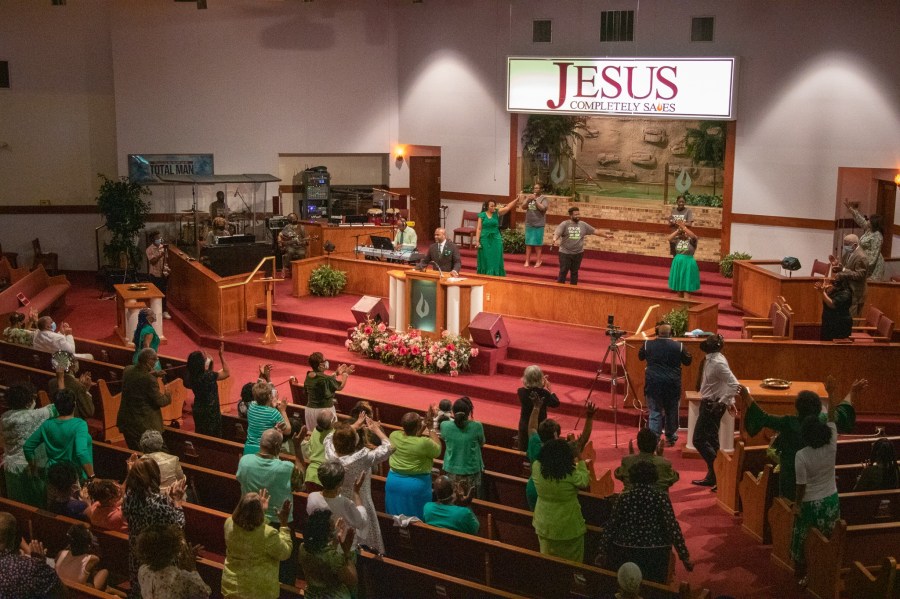Over two decades, Rev. Rodrick Burton of the New Northside Missionary Baptist Church in north St. Louis County has buried too many in the community who lost battles with mental illness and addiction.
“It’s things that are potentially treatable,” Burton said. “When suddenly, if a person is dealing with schizophrenia, you can’t help them spiritually … it can challenge some people’s faith.”
He is one of a group of Black pastors and laypeople envisioning a better way: regular churchgoers providing support for their neighbors who are facing mental health crises or recovering from substance abuse.
If you or someone you know needs help, resources or someone to talk to, you can find it at the National Suicide Prevention Lifeline website or by calling 1-800-273-8255. People are available to talk to 24/7.
The idea is that as community hubs, churches can reach into neighborhoods when the health system can’t.
Bridges to Care and Recovery was started in 2015 by the Behavioral Health Network of Greater St. Louis, after 29-year-old Anna Brown refused to leave an area emergency room. She had a history of mental illness, was unhoused and complained of pain. Still, she was arrested and put in Richmond Heights City Jail, where she died that night of a treatable blood clot.
“A group of pastors came together and they decided this would never happen again if they could help it,” said Rose Jackson-Beavers, program manager.
After Brown’s death, the hospital, St. Mary’s Health Center, worked with local Black Christian leaders to develop a program based on mental health first aid. Developed in the aftermath of 9/11, the model had widespread success in white communities — but often failed to reach Black individuals due to a lack of trust in health professionals, Jackson-Beavers said.
Something different was needed.
PRESSING WORK
Burton’s church of about 500 people is just 10 minutes away from where Michael Brown was shot and killed by Ferguson Police in 2014. One in four residents in the area live in poverty, a majority of those children under 15, according to census data.
Burton has performed hundreds of funerals but said in the past few years, addiction or poor mental health have contributed to about 20 percent of deaths.
“There’s been like episode after episode, incident after incident,” Burton said.

Life expectancy in this area is more than a decade lower than in the surrounding, more affluent communities. Black men and women are more likely to be hospitalized for a serious mental illness, die of suicide, overdose or from police violence, experience houselessness, or report depression and anxiety.
These are all compounded by the fact that Black culture often stigmatizes going to a therapist or doctor to seek out help, Jackson-Beavers said.
[Many] “Black people don’t trust doctors. It’s been proven over and over we don’t get the best care, we don’t get the best information,” she said. “We (lean) on faith in the church for almost all of our resources, all of our pain, all of our issues. Why not lean on (the church) for mental health?”
The nonprofit group trains Black church congregations on how to use naloxone, perform addiction and depression screenings and give workshops on mental health during church services and on social media.
One in every five churches in the area is taking part in the program, now in its sixth year. In total, more than 100 churches have joined the network, with 369 pastors and congregants trained as coaches.

In 2021, Bridges was responsible for 69% of referrals to their mental health hotline. Last year, almost 250 people were referred to free services such as counseling, health care or housing; 42% of them were uninsured.
After hearing of Bridges’ success, spiritual leaders in San Antonio formed a similar organization with 25 churches and 300 trained members.
“It’s a faith issue,” Jackson-Beavers said. “If the pastor is speaking from the pulpit and says it’s OK to get treatment, I might go get help.”
HEALING TO HELP OTHERS
Becoming a wellness champion, as they call their coaches, requires training once a month for seven months. That adds up to about 20 hours of training, including suicide prevention, signs of toxic stress, anxiety or depression, identifying human trafficking and how trauma shows up in adults and children.
The program — funded by local mental health departments — connects these churchgoers, and their friends and families, with more than 100 local mental health and addiction resources.
Often it’s as simple as passing along the number to a crisis hotline, offering to talk if needed. And a lot of that work happens on social media, where coaches tell their followers, “It’s OK not to be OK.”
That phrase is key to the program’s message of ending the stigma around mental illness, which coaches said is still a major hurdle. Research shows the peer-to-peer model allows the champions to make inroads when mental health departments can’t.
The church-based, physical health programs are particularly successful in the Black community. But there’s limited evidence these programs work as well to address mental health, largely because it has not been widely studied.
One study of recovery programs in Black churches in Los Angeles found the most successful helped participants navigate the often confusing network of nonprofits, government agencies, clinics and hospitals to receive treatment.
That help is often the missing piece to someone getting care.
“I was struggling with my own mental health issues and the only way I saw it addressed, it was a (Bridges) flyer,” said Dameena Cox.
Now a coach herself, Cox tells people, “I turned to God first, but he also had me seek therapy. … And once you get healing, you can help others.”
Correction: A previous version misspelled Rev. Rodrick Burton’s first name.






